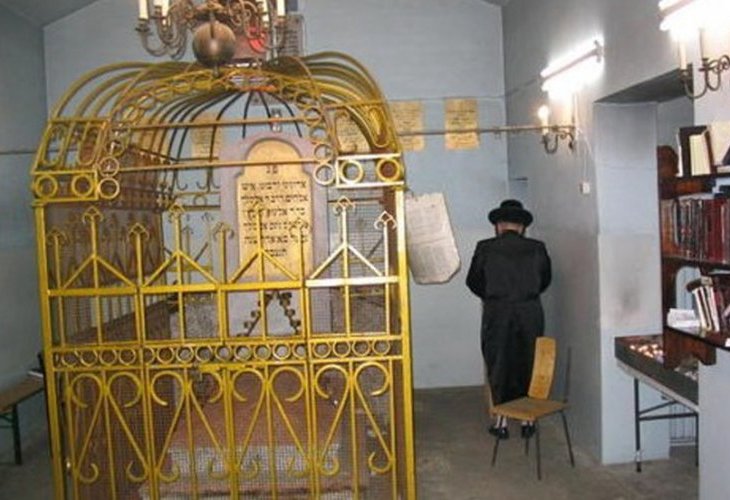Torah Personalities
Righteous Blessings from Rabbi Elimelech of Lizhensk
Today marks the Yahrzeit of Rabbi Elimelech of Lizhensk, a day known for special blessings. Let's explore some of these meaningful tales.
 The resting place of the 'Noam Elimelech'
The resting place of the 'Noam Elimelech'The 21st of Adar is the yahrzeit of Rabbi Elimelech of Lizhensk, author of the 'Noam Elimelech'. This day is known for its many blessings. Let me share some with you.
The holy books say: just saying 'Lizhensk' can bring salvation!
For Chasidim and those who perform good deeds, the 21st of Adar, Rabbi Elimelech’s yahrzeit, is as significant as Yom Kippur, and no Tachanun is recited.
Rabbi Elimelech wrote the book 'Noam Elimelech', which the righteous 'Maadanei Melech' stated brings wealth to those who study it. Studying it on Shabbat grants abundance and an additional soul level as well. It is even meaningful to read it without understanding, because the holy text impacts you anyways.
It is told that the Rebbe of Biala wouldn’t enter a house without a 'Noam Elimelech'.
This book is known to offer protection and even healing, when placed under a sick person’s pillow, or under a birthing mother's pillow for an easy delivery.
The Rebbe of 'Chelekesh Yeshua' celebrated a 'Tish' on the eve of the 21st of Adar, sharing the 'Noam Elimelech' among his followers. Each took advice and blessings for the year from the book (you can too).
Visiting the righteous brings salvation. Rabbi Meir of Premishlan believed visiting a Tzadik instills fear of Heaven, and the spirit of repentance grows at Rabbi Elimelech’s resting place.
Rabbi Elimelech stated that visiting his grave grants the same salvation as during his life, and touching the door handle of his home ensures one won’t die without repenting.
There’s a tale of a man over 110 years old, tired of life, whose family member sought a blessing for his death from Rabbi Meir of Premishlan.
He was not an observant Jew and had never repented before. Rabbi Meir found that in his youth, he was a coachman who once brought people to Lizhensk, entering Rabbi Elimelech’s house to call travelers.
Rabbi Meir said, “You can’t die without repenting; you touched Rabbi Elimelech’s door!” The man indeed repented and passed away...
During World War II, when Germans tried desecrating Jewish cemeteries, they couldn’t damage Rabbi Elimelech’s grave, as testified by a Gerrer Chasid.
Rabbi Elimelech’s burial site is a hub for Jewish prayers to be heard and answered.
The Rebbe of Shomrei Emunim instructed his followers to share three stories on Rabbi Elimelech’s yahrzeit, the 21st of Adar, assuring ample provision for Pesach.
The Maggid of Kozhnitz also recommended telling these stories on Shabbat M'varchin Nissan.
Today, light a candle for Rabbi Elimelech, read Tehillim, and bring the 'Noam Elimelech' book into your home.
Here are the three stories:
These stories linked to Rabbi Elimelech are told on his yahrzeit and are blessings for prosperity.
The First Story:
A poor man couldn’t afford Pesach supplies. He wrote a letter to the great King, Creator of the world, asking for money for Pesach supplies, signing his name and address. He placed the letter in the forest, under a tree. The king of that land, out hunting, found the note. Seeing “to the great King”, he assumed it was for him, and sent the Jew a large sum for Pesach. Just as the Creator helped this Jew, may He help us too, Amen!
The Second Story:
A man couldn’t afford Pesach supplies. He decided to trade by selling wine to a neighboring country. He bought barrels of wine, but customs wouldn’t let him pass. The Jew ran to Rabbi Elimelech of Lizhensk seeking advice. Rabbi Elimelech blessed the wine to turn to water, and it did. The Jew passed customs with “water” barrels amidst laughter... but what to do with water? He ran back to Rabbi Elimelech, who blessed the water back to wine, and it happened. He sold the wine for a high price and bought ample Pesach supplies. Just as the Creator helped this Jew, may He help us too, Amen!
The Third Story:
A tale of Moshe the poor tailor, earning meager pennies. One day, a ruthless noble, a hater of Jews, tried to shoot him. Moshe survived but fainted in fright. The noble's wife pitied him, asking what he did, learning Moshe was a tailor – she employed him in her palace. Fortune smiled on Moshe, who began earning well and repaying debts.
One day, the noble asked Moshe, “How's your livelihood?” Moshe replied, “Baruch Hashem, He provides abundantly.”
The noble angrily retorted: “The livelihood is due to my wife...”, and he expelled Moshe penniless. As Pesach approached, Moshe relied on Hashem for abundant Pesach provision. Meanwhile, in the palace, the noble counted his gold coins, biting each and placing it in a box. A monkey the noble owned, copied him, and swallowed all the gold coins. The monkey died, and the wicked noble, to mock the Jew, tossed the monkey's corpse into Moshe's yard with great noise. Moshe awoke to find a dead monkey outside, gold coins spilling from its mouth. Moshe became wealthy, with abundant Pesach provisions. And as the Creator helped Moshe the tailor, may we also find such favor, Amen and Amen!

